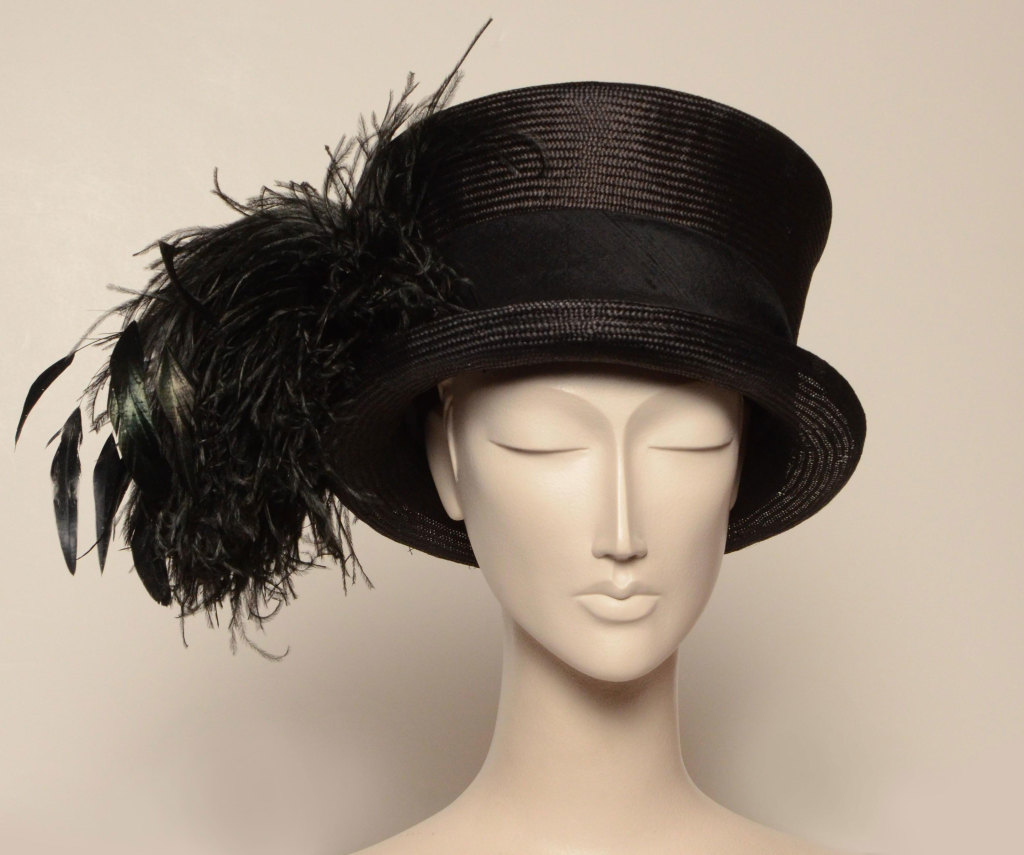
Photo and beautiful black hat by Diana Cavagnaro
I’ve had two love affairs for as long as I can remember, with poetry and with hats. Mother Goose rhymes and rain bonnets, jump rope songs and sun caps, lullabies and snuggly warm beanies.
For a long time, I’ve been wanting to write a poem about hats, and then this fall I took Robert Pinsky’s “The Art of Poetry” class, where I learned it was OK to write poems that are parodies. I’ve done so many times, diving into the meter and sounds of a favorite, changing out the words and the imagery, but matching the cadence, the line length, and perhaps the theme. Before taking Pinsky’s class I felt this was cheating. An enjoyable process, but wouldn’t a real poet start from scratch?
This fall I learned not to take myself so seriously. Not to be so persnickety and rigid. And I wrote a hat poem that parodies Wallace Steven’s “Thirteen Ways of Looking at a Black Bird.”
Thirteen Ways of Looking at a Black Hat
— Lynda Felder
I
Among twenty black chapeaux,
The only thing stationary
Was the cloth of the black hats.
II
I wish I had three heads,
As did Mozart
That I could wear three black hats.
III
The black hat swirled in the summer breeze
Feathers dipping and bowing to rustling trees
IV
A woman and her shoes
Are one.
A woman and her shoes and a black hat
Are one.
V
I sometimes can’t decide,
Between the classic pillbox
The black lace mantilla,
Or perhaps the felted wool
Fedora.
VI
Obsidian birds, glassy and black
With beaks sharp as needles
Wings fluttering to and fro
Making shadows on the brim
A veil of mystery,
Dark tulle, and claws.
VII
O thin fabric of tichel,
Why do you imagine gold and rose?
Do you not see how your black silk
Softly covers the hair
Of the woman who loves you?
VIII
I know silvery trim
Buckles and preternatural ribbons of fire;
And I know, too,
That a black hat makes a statement
It always does.
IX
When the black hat’s top went solar,
Round the hat’s edge
A toy train ran in circles.
X
With the acoustics of a black hat
Worn to the symphony,
Even the oboes
Will listen deeply
XI
She drove to Michigan
In a sports car.
Happy and secure,
In her comfortable
Black hat.
XII
The night is approaching.
The black hat must be worn.
XIII
It was hat hair all afternoon.
It was smashing
And it was going to smash.
The black hat poised
In the crowded room.
In truth, i have a love/hate relationship with Wallace Stevens’ poetry. But when I read “Thirteen Ways of Looking at a Black Bird,” it’s all love. In his luscious poem, Stevens mimics haiku, but there’s no fixation on the traditional format and number of syllables. The language is sparce, dreamy and poignant. It reminds me of the thrill that ran down my spine when I learned that stories could be told from multiple perspectives. It reminds me of the movie, Rashomon. And it shouts for parody.
“Thirteen Ways of Looking at a Black Bird” is in the public domain, and so, happily, I will end with this delicious poem.
Thirteen Ways of Looking at a Black Bird
— Wallace Stevens (1879 – 1975)
I
Among twenty snowy mountains,
The only moving thing
Was the eye of the blackbird.
II
I was of three minds,
Like a tree
In which there are three blackbirds.
III
The blackbird whirled in the autumn winds.
It was a small part of the pantomime.
IV
A man and a woman
Are one.
A man and a woman and a blackbird
Are one.
V
I do not know which to prefer,
The beauty of inflections
Or the beauty of innuendoes,
The blackbird whistling
Or just after.
VI
Icicles filled the long window
With barbaric glass.
The shadow of the blackbird
Crossed it, to and fro.
The mood
Traced in the shadow
An indecipherable cause.
VII
O thin men of Haddam,
Why do you imagine golden birds?
Do you not see how the blackbird
Walks around the feet
Of the women about you?
VIII
I know noble accents
And lucid, inescapable rhythms;
But I know, too,
That the blackbird is involved
In what I know.
IX
When the blackbird flew out of sight,
It marked the edge
Of one of many circles.
X
At the sight of blackbirds
Flying in a green light,
Even the bawds of euphony
Would cry out sharply.
XI
He rode over Connecticut
In a glass coach.
Once, a fear pierced him,
In that he mistook
The shadow of his equipage
For blackbirds.
XII
The river is moving.
The blackbird must be flying.
XIII
It was evening all afternoon.
It was snowing
And it was going to snow.
The blackbird sat|
In the cedar-limbs.
